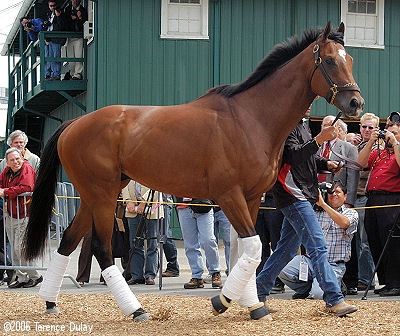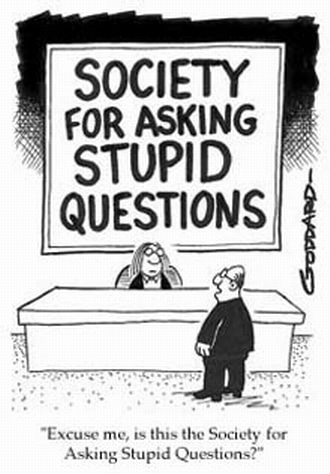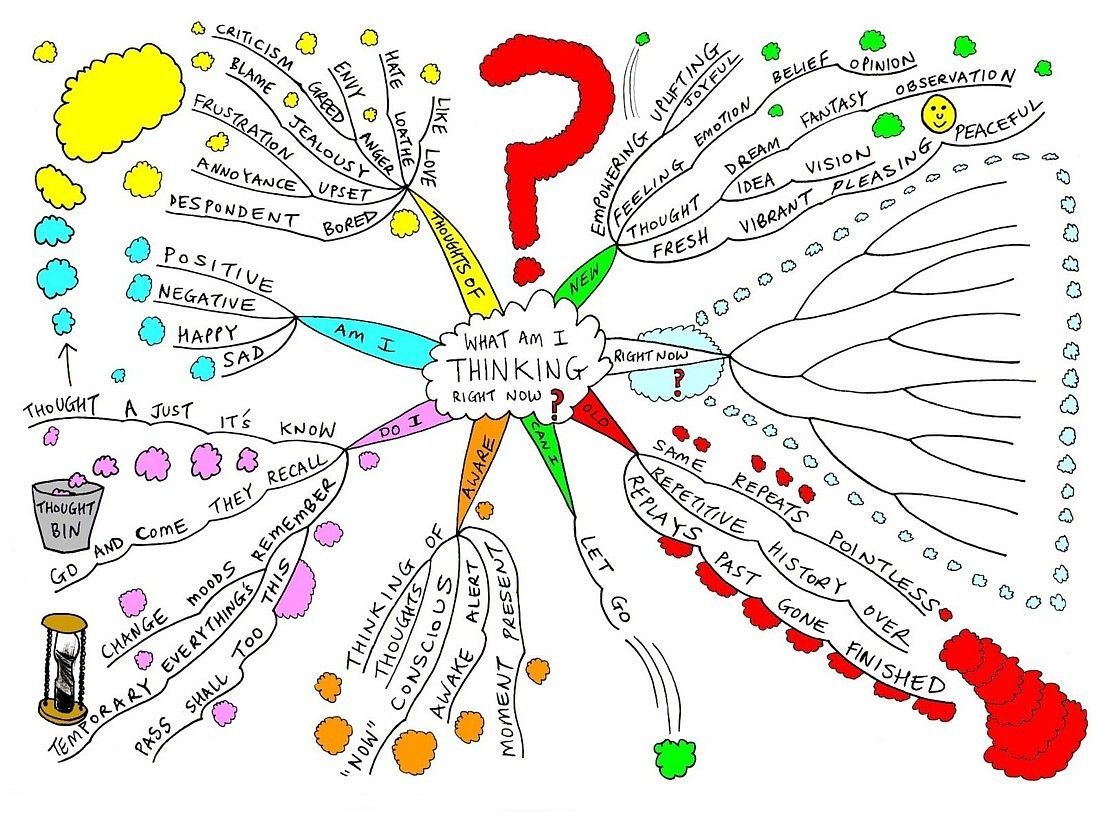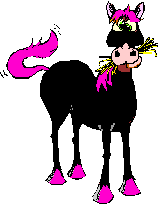 Somewhere in veterinary school I learned a lesson. I don’t remember who taught it to me, but it stuck. And I want you to keep this very important thing in mind. Veterinarians don’t heal anything. NOBODY heals anything.
Somewhere in veterinary school I learned a lesson. I don’t remember who taught it to me, but it stuck. And I want you to keep this very important thing in mind. Veterinarians don’t heal anything. NOBODY heals anything.
Thanks to my education and my experience, I can sometimes help horses (and, by proxy, their owners). Sometimes, I can even help save a horse’s life – and let me tell you, there’s no better feeling. When I help make a difference, the feeling is intoxicating. Nothing makes me feel better than knowing that I’ve helped such a beautiful and powerful animal back to health, and relieved the fears and concerns of the horse’s owner. Such goals really are the holy grail of veterinary medicine.
They are also a trap.
I’ve heard lots of people – not just veterinarians – call themselves “healers.” Being seen as a “healer” is a badge of honor. It’s like an almost mystical “higher calling.” Healing is a link to days gone by, when medicine was a mystery and health was elusive. Centuries ago, life was, as Thomas Hobbes, the 17th century British philosopher noted, “Nasty, brutish, and short.” Throughout most of the course of history, when it came to medicine, people couldn’t do so much (for horses OR people). But in spite of ineffective remedies, medical patients got better anyway (when they could get better). So I suppose that it’s only natural that many begin to believe that when healing occurred, it came from the person: from touch, from intention, or from their mystical, now-mostly-proven-wrong “knowledge.” Today, there are some folks who say that they have special knowledge, too.
 But they don’t. Be careful of folks who say that they’re healers. Look for helpers.
But they don’t. Be careful of folks who say that they’re healers. Look for helpers.
The horse does the healing, not the veterinarian, not the massage therapist, not the chiropractor, not the laser therapist, not the farrier: not anyone. Fortunately, for those of us that try to keep horses in good health, it is sometimes possible to help set up a situation where the horse’s body can heal itself. Use antibiotics to kill some bacteria and the horse will take care of the rest. Put the edges of a wound next to each other with sutures and the horse will usually knit them back together. Take out a piece of sick piece of intestines from a horse with colic so that the healthy gut can continue to function; the gut usually grows back together and the horse gets on with life. A tendon usually recovers from a “bow,” whether you want to put expensive (and unproven) therapies into the mix, or not. You get the idea.
But, remember, it’s the horse that does the healing.
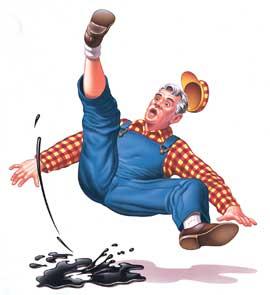
You’re bound to slip up sometime
What’s the point of all this? Well, I think that the belief or claim that anyone or anything is going to heal anything isn’t good. I think it’s an often-expensive delusion. I think that the belief or claim that someone is a healer leads to all sorts of inflated claims, expensive treatment excursions, and therapeutic dead ends. In fact, I think that if someone tells you that he or she is going to heal something, you should turn around and run away.
Here are some things to think about.
A HEALER is going to fail sometimes, and, ultimately, he or she always will. No matter how much anyone knows, there are horse problems that aren’t going to get better. They aren’t going to get better no matter how many injections, adjustments, lights, magnets, pins, or poultices get applied. Some problems simply can’t be solved. Even when one problem resolves, it won’t be long until there’s another one: that’s how life is. So, if the only goal is to heal, then the ultimate result is eventually going to be failure. The system (the horse) is designed to give out, and there is nothing – NOTHING – that anyone can ultimately do about it. Everyone who provides care to a horse is like Horatius at the bridge. If all people are concerned about is healing, it’s ultimately a no win situation.
 BUT A HELPER can always succeed. The fact is that it’s not always possible to fix the problem that’s causing the pain that’s making a horse limp. But I can often help reduce it by providing medication, suggesting an appropriate exercise regimen, changing the shoeing, etc. I can also help a horse owner understand what’s going on, and reduce his or her anxiety, helping to bring comfort to him or her, too. Even in the worst situations, where the horse’s condition is hopeless, I can still help ease the horse’s transition out of this life, and help an owner understand. I can help bring peace. Every visit that I make, every phone call that I take, is an opportunity to help a horse and to help a person, to provide benefit from my experience and knowledge. And when I’ve helped, I’ve done something important and lasting.
BUT A HELPER can always succeed. The fact is that it’s not always possible to fix the problem that’s causing the pain that’s making a horse limp. But I can often help reduce it by providing medication, suggesting an appropriate exercise regimen, changing the shoeing, etc. I can also help a horse owner understand what’s going on, and reduce his or her anxiety, helping to bring comfort to him or her, too. Even in the worst situations, where the horse’s condition is hopeless, I can still help ease the horse’s transition out of this life, and help an owner understand. I can help bring peace. Every visit that I make, every phone call that I take, is an opportunity to help a horse and to help a person, to provide benefit from my experience and knowledge. And when I’ve helped, I’ve done something important and lasting.
HEALERS can get rather inflated opinions of themselves. “Nature cures – doctors take the credit.” That’s an epic quote, from the 18th century French philosopher, Voltaire. Horses often do heal. But it’s not always clear if the treatment caused the recovery. A horse with a colic may improved after some treatment, but it may just be the passage of time. But you can be sure who is going to take the credit, once any treatment is given. Healing is something that happens in the horse. Horses tend to get better, whether anyone else is is involved at all. Anyone who thinks of him- or herself as a “healer” simply has a falsely high opinion of his or her knowledge and abilities.
 HELPERS have more realistic priorities. Helpers don’t think of themselves as having some special powers. They don’t have secret treatments unknown to everyone else, or diagnostic capabilities available only to a select few. A sports medicine “specialist,” a “certified dentist,” or an “equine chiropractor” doesn’t know the anatomy of a horse any better than any other veterinarian who has cared to spend the time learning. A specialist in “Traditional Chinese Medicine” doesn’t have secret knowledge (in fact, what they’re telling you probably isn’t even related much to the “traditions” of the horse medicine practiced in China centuries ago). Medicine isn’t magic (I know, I’m also a magician). And it isn’t a “calling” or something for which anyone has been somehow “chosen.” Helpers just try to help horses and the people who own them. The focus should always be on the horse, not the “special” status of the person who is there to provide care.
HELPERS have more realistic priorities. Helpers don’t think of themselves as having some special powers. They don’t have secret treatments unknown to everyone else, or diagnostic capabilities available only to a select few. A sports medicine “specialist,” a “certified dentist,” or an “equine chiropractor” doesn’t know the anatomy of a horse any better than any other veterinarian who has cared to spend the time learning. A specialist in “Traditional Chinese Medicine” doesn’t have secret knowledge (in fact, what they’re telling you probably isn’t even related much to the “traditions” of the horse medicine practiced in China centuries ago). Medicine isn’t magic (I know, I’m also a magician). And it isn’t a “calling” or something for which anyone has been somehow “chosen.” Helpers just try to help horses and the people who own them. The focus should always be on the horse, not the “special” status of the person who is there to provide care.
HEALERS may promote unrealistic expectations. I’ve seen it. I’ve seen people’s frustration when I’ve told them I can’t fix their problem or remove their horse’s pain. They feel like the horse shouldn’t have to go through what it’s going through. They feel like if there is something wrong it’s because I’ve missed something, or because they’ve done something wrong. They feel like there’s something that they have to do, have to try. They feel like there’s got to be one more thing out there to heal the problem, if they can only find it. And when one fails, there’s always another healer ready to come along.
 The sad fact is that there are no miracle cures; no magic bullets. No one heals anything. Plus, if there were miracle cures, everyone would know about them, and everyone would be using them. You can’t keep effective cures a secret.
The sad fact is that there are no miracle cures; no magic bullets. No one heals anything. Plus, if there were miracle cures, everyone would know about them, and everyone would be using them. You can’t keep effective cures a secret.
BUT IF I’M A HELPER… it helps me stay grounded. I can help keep expectations realistic. If my clients see me as trying to help, they listen to me differently. I’m standing with them, not above them. When I’m offering help, people listen – when I try to flex my wisdom muscles, they often don’t.
IF I THINK I’M A HEALER… I may not be satisfied unless I heal something. And, in the process, it’s easy to loose sight of the client, who is footing the bill. Some people get so intent on healing that they can even cause harm to horses, by insisting on providing useless treatments even as a condition gets worse.
There are three truths in the horse medicine business.
- Everyone wants – more than anything – for horses to get better
- There’s no cure for every condition
- Some people try to take advantage of #1 and downplay #2
 It’s that third thing that often seems to be the problem. Even though there’s no cure for every ill – even though everyone wants to heal everything – there’s still pressure to find a “magic bullet.” And there are LOTS of people who say that they have one.
It’s that third thing that often seems to be the problem. Even though there’s no cure for every ill – even though everyone wants to heal everything – there’s still pressure to find a “magic bullet.” And there are LOTS of people who say that they have one.
These two truths confront everyone, and especially so when the truth about a horse’s medical condition makes us feel powerless. The quest for healing can lead to the an endless stream of unnecessary tests, unnecessary procedure after unnecessary procedure, and prescription after prescription of medications that do little good. Healers don’t feel comfortable standing helpless – they want to do something. Healers will do almost anything to try to maintain their role. Some are even drawn away from veterinary training, and instead are drawn to the task of finding some miracle through the “wisdom of the ancients,” or by using some plant, or pressure point. And, in doing this, healers can cause significant harm, in many ways, both direct (to the horse) and indirect (to the client’s pocketbook, for example).
 BUT IF I’M A HELPER… it means that I’m as much concerned about doing harm as I am about the horse getting better. The more I focus on helping, the less concerned I get about offering a test, a surgery, or a prescription. As a helper, I don’t need to prove that I can do the impossible, and I can consider very carefully if the risk of a treatment is worth the potential benefit. I can help save the horse from needless interventions, help save my clients money, and I can help bring a peace, understanding and contentment to the relationship between horse and owner.
BUT IF I’M A HELPER… it means that I’m as much concerned about doing harm as I am about the horse getting better. The more I focus on helping, the less concerned I get about offering a test, a surgery, or a prescription. As a helper, I don’t need to prove that I can do the impossible, and I can consider very carefully if the risk of a treatment is worth the potential benefit. I can help save the horse from needless interventions, help save my clients money, and I can help bring a peace, understanding and contentment to the relationship between horse and owner.
IF I’M A HEALER… competition can be a threat. Healers have long been held with a certain reverence. They possess a certain “secret knowledge.” Knowledge, of course, is power. With the ready availability of information, it’s not that way so much anymore. Pretty much everyone now has access to everyone else’s knowledge. This may be a problem for some people. If you’re jealous of your healing power, you might be inclined to discourage people from doing their own research. You might be inclined to defend your own turf, and attack folks who are in competition with you (saying, for example, that your way is “natural” and any other way is “bad”). You might have trouble supporting your healing beliefs but you have to claim them just the same.

Consulting Dr. Google
BUT IF YOU’RE A HELPER… it’s easier to exist in the information age. Like it or not, I am compared to pretty most everyone. Most horse owners don’t care where they get their horse’s care; they are looking for the same things from everyone. Horse owners are trying to help their horse’s feel better, and at the same time decrease their own fears and anxieties about what’s wrong with their horse.
I think that if I can offer help, my offer will stand up well next to the miracles that other “healers” may promise. And, since all I really care about is helping, if people find something that helps their horse, I’m really happy. I’m never upset to learn about other ways to a successful outcome. When people talk about “horse health care,” it implies a relationship that’s built up for only one thing: the sake of a horse’s health. I believe the best way to build that relationship is to have a realistic view of who we are and what we do.
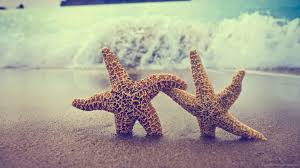 Does it really make a difference what I call myself, as long as I get to practice veterinary medicine? I think it does. I think that being a helper is a much better alternative to being a healer. Maybe being a helper is boring, but I think it’s more realistic. I think it’s much better way to practice veterinary medicine. I don’t mind taking a phone call or an email from someone who is concerned about his or her horse. I’ll let the horses do the healing. I’m just trying to help.
Does it really make a difference what I call myself, as long as I get to practice veterinary medicine? I think it does. I think that being a helper is a much better alternative to being a healer. Maybe being a helper is boring, but I think it’s more realistic. I think it’s much better way to practice veterinary medicine. I don’t mind taking a phone call or an email from someone who is concerned about his or her horse. I’ll let the horses do the healing. I’m just trying to help.


